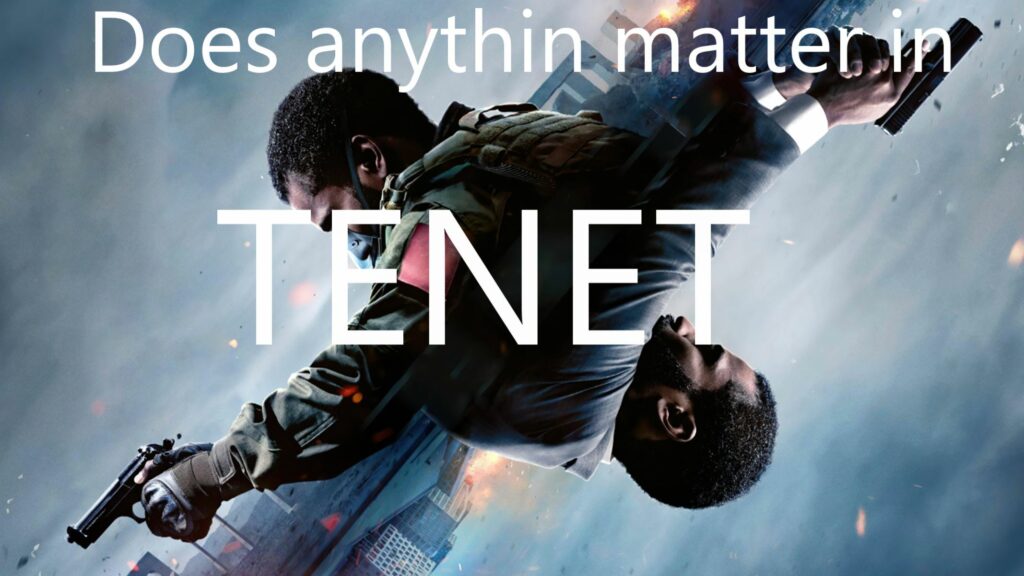He guys, I have returned from my summer vacation and I wanted to let everybody know that my second YouTube video is online. In it I delve into the movie TENET by Christopher Nolan to see if its characters have free will. You can see the video here or just follow the YouTube link. Don’t forget to like and subscribe the video. I know some parts of it may still be a little rough, but it is only my second. From now on I will focus on making shorter vids with more focus on a singular topic. For a link to my first video click on Mysteries of Dune.
Below you can also read the script I wrote.
Intro
Tenet is Christopher Nolan’s masterpiece that saved last year’s cinema – for the most part. As can be expected from the director of Memento, Interstellar and Inception Tenet is mindboggling. On paper the story involves time-travel. But unlike Back to the Future or The Terminator the time-travel it is not instantaneous. The characters do not travel from the present to the past or future in the blink of an eye. Instead, characters such as the nameless Protagonist invert and travel back in time at the same speed as they would travel forward. People and objects that are inverted can interact with the world and for appearance’s sake do the opposite of what we think they should do.
INSERT CLIP TENET PROTAGONIST CATCHING PISTOL ROUND, CAR UNFLIPPING, GLASS REPAIRING
People appear to walk backwards and an object will defy gravity and return to a person’s hand if their intend had been to drop it. To travel forward an inverted person would have to invert again, the same goes for an object.
The concept is mindboggling, despite seeing Tenet multiple times in cinema and hearing the warning by the scientist Barbara who studies time inversion it is hard to go by intuition. Any fan of a movie such as Tenet will attempt to fully understand it. How does time inversion work as a mechanism? How does it affect its characters and its story? Did the writer of the screenplay, in this case director Christopher Noland make a mistake? Are there plot holes? Even a year after its release Tenet still provokes questions, and it feels as if the director might have covered for himself.
Deterministic
I am referring to a line spoken by the character Neil to the Protagonist. About half-way through the movie the Protagonist attempts to steal a piece of the time-inversion weapon from a convoy. The villain Sator is doing the same with the Sator that is moving forward in time instructing the Sator that will later invert on how to obtain the artifact.
The Protagonist is quickly confronted with inverted opponents driving a car that is similarly inverted. The inverted Sator threatens to kill his abused wife Kat if the Protagonist does not throw him the case with the artifact. The Protagonist gets a glimpse of his inverted self and decides on a bold move. He throws the empty case to Sator and the artifact to his inverted self, it landing in the car. The idea being that his future self will decide to invert and take possession of the artifact. However, the inverted Sator sees the handoff and causes the inverted Protagonist to crash his car. The inverted Sator now tells one of his goons who is moving forward to pick up the artifact from the crash.
All this means that the actions of the inverted Protagonist were for nothing. When the Protagonist is later confronted by Neil about changing the past the response is “What’s happened, happened”.
INSERT CLIP TENET OF NEIL REMINDING PROTAGONIST
Some have come to believe this to mean that the actions of the inverted Protagonist cause Sator to obtain the artifact. As though there was no alternative. This concept is difficult to prove, as proving the opposite is impossible. It depends on whether our world is deterministic? Do we have free will? Or is only our past set-in stone? Is it possible to change even one iota in the world of Tenet if we invert?
All of the characters except Neil certainly do believe that. Initially, the Sator that inverts believes that the artifact is in Neil’s and Protagonists getaway car – the BMW, because the Protagonist lied about it. We even see the inverted Sator check that car. The inverted Sator eventually sees the handoff of the artifact between the Protagonist and the inverted Protagonist. For the inverted Sator going back in time ended up helping his goals.
Had the Protagonist not inverted there would have been no hand-over and the inverted Sator would have presumably killed Kat but not obtained the artifact. But that is an alternative scenario. Was there a choice? Afterall, the Protagonist saw his inverted self, could he have decided then and there not to invert? Neil’s statement contradicts this, but he also states that the effects of seemingly changing the past are unknowable. From that I will conclude with saying that Tenet is not actually deterministic, free will is possible in that its characters can choose from alternative paths, at least to a degree. But should that matter for our actions?
Choice matters
Professor of Philosophy David Kyle Johnson wrote two articles relating to Tenet on this topic, which I will be discussing next.
In short, what I have been discussing so far can be summed up as a paradox. The Protagonist caused Sator to get the artifact because he caught a glimpse of his inverted self, this caused Protagonist to commit to an action that he thought would keep the artifact hidden. But there is a way out of this paradox. According to philosopher David Lewis’ famous solution to paradoxes time travel may be possible if the structure of time prevents them from occurring. This leads to the rule that time travelers can only do what they are fated to do.
This also means you cannot do anything else in the future but what you will because your fate is sealed. Just because you remain ignorant of the future it may seem you can do anything, but this is just an illusion. Thus, an important philosophical message from Tenet is: We are not free. Humans do not have free will. This leads to some to believe that nothing they do really matters, but this fundamentally misunderstands the fatalist conclusion we can draw from Tenet, which brings us to its second philosophical message. Our actions may be sealed, but they are still interesting / entertaining, not doing anything is a wrong-headed approach.
Fatalism does not entail that our actions don’t matter – that regardless of what you do, the same thing will happen. Actions are not without consequences even if all your actions are fated. Even if I cannot do anything but a certain action it remains true that if I could, things would be different. And so, it very much matters if I do. Would you not want to be the causal factor that determines the future? This means the eventual outcome may be set, but not the road it takes to get there. This explains Neil’s sacrifice at the end of Tenet. He realized that going back into the fray is necessary for them to have won the fight against Sator.
So, to sum it up. Our actions matter. And so, fatalism is, indeed and expression of the “mechanics of the world, not an excuse to do nothing”.
Avengers: Endgame
Despite Tenet being unique with its concept of time-inversion, in that objects and people can move backwards in time, time-travel and determinism have recently been part of popular culture. The most famous example is Avengers: Endgame in which the group of superheroes attempt to reverse what the villain Thanos managed in the previous movie – reduce all living things in the universe by half.
However, despite using what is referred to as the Quantum Realm to travel back in time they know they cannot undo the past. The Hulk states this somewhat elegantly.
INSERT CLIP OF HULK FROM AVENGERS: ENDGAME
If you travel back in time, from the moment in the past to your former present is set in stone – it is deterministic – as you cannot change the future without introducing a paradox. However, if you adhere to the rule that you cannot change the former present as you know it a lot will become possible. After all, for all we you were meant to travel back in time to perform action seemingly in keeping with the ‘normal’ timeline. In Avengers Endgame the heroes steal the Infinity Stones the villain will end up using.
Afterwards they travel back to the present. There they use them to undo the villain’s actions. Then the stones are brought back to the moment in the past they were stolen. Thus, the past remains as it always was, and the villain is none the wiser. The Marvel concept of time-travel appears well thought out and does not fall into the trap of merely undoing past actions using a time machine. The sorrow that accompanies past events remains.
There are similarities with Tenet, despite the time from the past to the present being deterministic actions by the heroes feel good. The question that remains is of course were events hard deterministic. Did the Avengers interfere with a new present and future when they stole the Infinity Stones? Or were these actions always going to happen. Despite Tenet’s message that one should not fall into the trap of fatalism not knowing if we had a choice is probably the most bitter pill to swallow.
Devs
Another franchise that has dealt with determinism is Alex Garland’s Devs that aired last year. In the series the character Lilly has started work for the company Amaya that has developed a Quantum Computer. The leadership of the company headed by the enigmatic Forest use it to get a glimpse of the future. As a result, the moment from the present to that point in the future becomes hard deterministic with no way for it to alter. All of the actions by people, their thoughts included cannot be changed, they do not have free will. And all of this is glimpsed by a few who know what will happen, until the catastrophic moment that will kill everybody involved.
Devs is difficult to watch, bad things happen to good people with apparently no other outcome possible. The emotions that characters on Devs show towards this are part of the deterministic future they are experiencing. Devs does end on somewhat of a high-note. Near the moment of catastrophe, Lilly manages to overcome their future with sheer will power. Not only that, beyond the event horizon they gleamed into the future nothing is known.
Even if everything remains hard deterministic, there is no need to be fatalistic, as Lilly proved.
Outro to Tenet
Thank you for watching
I hope you enjoyed my video on determinism in Tenet. It is not an easy topic to understand with the director seemingly having left the issue open to debate.
Please click on the like button so the YouTube algorithm will look favorable on my video. If you want more content on franchises such as Tenet or Devs please click the subscribe button.
SHOW CARD WITH TRACK LISTING.




More Stories
A Happy New Year from SciFiEmpire
Wishing You A Happy Christmas, From SciFiEmpire.net
Things To Look Forward To in 2022